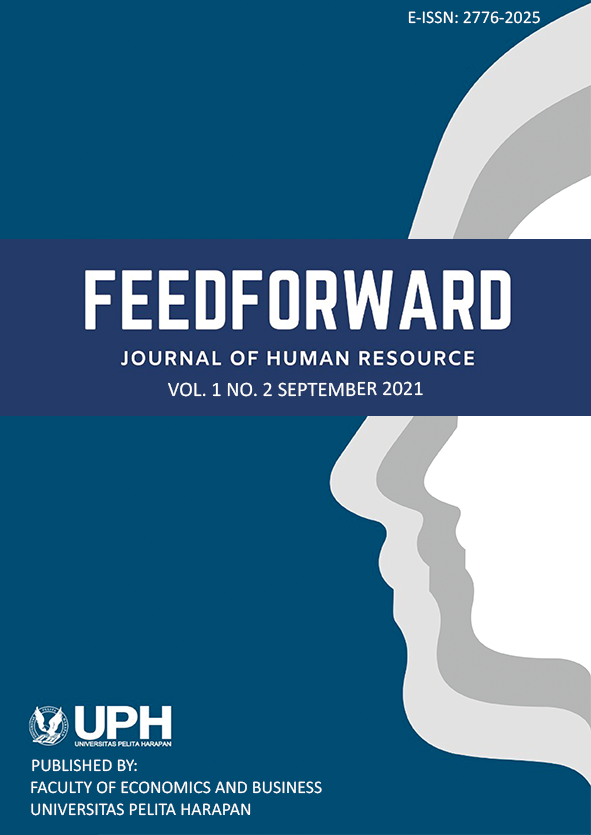Kontribusi Pemimpin Terhadap Kepuasan Kerja Karyawan [Leader's Contribution to Employee's Job Satisfaction]
DOI:
https://doi.org/10.19166/ff.v1i2.4344Keywords:
leader-subordinate relationship, task structure, strength of the leader's position, job satisfaction, hubungan pimpinan-bawahan, struktur tugas, kekuatan posisi pemimpin, kepuasan kerja karyawan, perbankanAbstract
This study aims to determine the effect of the leader-subordinate relationship, task structure, and strength of the leader's position on job satisfaction of Bank X employees in Jakarta and South Tangerang. This research is a quantitative research with survey using online questionnaire with Likert scale with 105 respondents who are employees of Bank X in Jakarta and South Tangerang. The results of this study indicate that the leadership-subordinate relationship, task structure, and strength of the leader's position altogether affect job satisfaction of Bank X’s employees in Jakarta and South Tangerang. Partially, the task structure and strength of the leader's position variables affect job satisfaction, while the leader-subordinate relationship has no effect on job satisfaction. This study emphasizes the relationship between the leader and subordinates, task structure and strength of the leader's position in order to be maintained so that employee productivity can increase in the company.
BAHASA INDONESIA ABSTRACT:
Penelitian ini bertujuan untuk mengetahui pengaruh hubungan pimpinan-bawahan, struktur tugas, dan kekuatan posisi pemimpin dengan kepuasan kerja karyawan Bank X di Jakarta dan Tangerang Selatan. Penelitian ini merupakan penelitian kuantitatif dengan survei menggunakan kuesioner online dengan skala Likert kepada 105 responden yang merupakan karyawan Bank X di Jakarta dan Tangerang Selatan. Hasil penelitian ini menunjukkan bahwa hubungan pimpinan-bawahan, struktur tugas, dan kekuatan posisi pemimpin secara bersama-sama berpengaruh terhadap kepuasan kerja karyawan Bank X di Jakarta dan Tangerang Selatan. Secara parsial, variabel struktur tugas dan kekuatan posisi pemimpin berpengaruh kepada kepuasan kerja sedangkan hubungan pimpinan-bawahan tidak berpengaruh terhadap kepuasan kerja. Penelitian ini menekankan hubungan antara pimpinan dengan bawahan, struktur tugas dan kekuatan posisi pemimpin agar tetap terjaga sehingga produktivitas karyawan dapat meningkat dalam perusahaan.
References
Budiman. (2015). Pengaruh kualitas hubungan antara atasan-bawahan terhadap perilaku kerja kontra produktif studi pada perawat rumah sakit khusus mata Palembang. Psikis: Jurnal Psikologis Islami, 1(2), 35-41. http://jurnal.radenfatah.ac.id/index.php/psikis/article/view/566
Cheung, Y. L., & Jang, H. (2019). Effects of task structure on young learners’ writing quality. INTESOL Journal, 16(1), 52-78. https://doi.org/10.18060/23193
Danial, R. D. M., & Komariah, K. (2017). Kepemimpinan yang efektif dalam meningkatkan kinerja usaha kecil dan menengah. Sosiohumanika: Jurnal Pendidikan Sains Sosial dan Kemanusiaan, 10(2), 209-222. https://journals.mindamas.com/index.php/sosiohumanika/article/view/921
Dessler, G. (2010). Manajemen sumber daya manusia edisi kesepuluh jilid satu. Indeks.
Farlianto. (2018). Pengaruh dimensi efektivitas kepemimpinan terhadap kepuasan kerja karyawan Rumah Sakit Permata Bunda Yogyakarta. Jurnal Ilmu Manajemen, 13(1), 22-50. https://doi.org/10.21831/jim.v13i1.22222
Kobayashi, M. (1995). The effects of text structure and test format on the measurement of reading comprehension [PhD Thesis, Thames Valley University]. https://doi.org/10.1191/0265532202lt227oa
Kobayashi, M. (2002). Method effects on reading comprehension test performance: text organization and response format. Language Testing, 19(2), 193-220. https://doi.org/10.1191/0265532202lt227oa
Locke, E. (1969). What is job satisfaction? Organizational Behavior and Human Performance, 4(4), 309-336. https://doi.org/10.1016/0030-5073(69)90013-0
Mehrang, F., & Rahimpour, M. (2010). The impact of task structure and planning conditions on oral performance of EFL Learners. Procedia - Social and Behavioral Sciences, 2(2), 3678-2686. https://doi.org/10.1016/j.sbspro.2010.03.572
Pitasari, N. A. A., & Perdhana, M. S. (2018). Kepuasan kerja karyawan: Studi literatur. Diponegoro Journal of Management, 7(4), 605-612. https://ejournal3.undip.ac.id/index.php/djom/article/view/22488
Zulaihah, I. (2017). Contigency leadership theory/pendekatan situational. Al-Tanzim, 1(1), 76-87. https://doi.org/10.33650/al-tanzim.v1i1.29
Downloads
Published
Issue
Section
License
Authors who publish with this journal agree to the following terms:
1) Authors retain copyright and grant the journal right of first publication with the work simultaneously licensed under a Creative Commons Attribution License (CC-BY-SA 4.0) that allows others to share the work with an acknowledgement of the work's authorship and initial publication in this journal.
2) Authors are able to enter into separate, additional contractual arrangements for the non-exclusive distribution of the journal's published version of the work (e.g., post it to an institutional repository or publish it in a book), with an acknowledgement of its initial publication in this journal.
3) Authors are permitted and encouraged to post their work online (e.g., in institutional repositories or on their website). The final published PDF should be used and bibliographic details that credit the publication in this journal should be included.


